|
|
|
Sort Order |
|
|
|
Items / Page
|
|
|
|
|
|
|
| Srl | Item |
| 1 |
ID:
142091
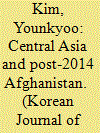

|
|
|
|
|
| Summary/Abstract |
As the NATO withdrawal proceeds in Afghanistan, both the Alliance and key members will encourage Central Asian states to assume more responsibility for providing their own security. But such a task is enormous for most Central Asian governments. Thus, they fear that they might be abandoned to Moscow, if not Beijing, or left on their own to face what they believe to be a mounting terrorist threat. This article examines the already visible military and strategic rivalry between Moscow and Washington for hegemony in Central Asia—mainly through support for weapon transfers, basing rights, and regional integration mechanisms in the security field.
|
|
|
|
|
|
|
|
|
|
|
|
|
|
|
|
| 2 |
ID:
142092
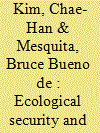

|
|
|
|
|
| Summary/Abstract |
The quality of the ecological environment and security are trans-national and national public goods, respectively. Conceptually, there are three different causal relationships between ecology and security. First, the improvement of security may make the ecological environment better in such cases as détente, followed by environmental cooperation while the degeneration of security deteriorates the ecology in such cases as war. Second, a military confrontation may restore natural ecological systems in such cases as the Korean Demilitarized Zone. Third, ecological cooperation can result in politico-military cooperation while environmental conflict can instigate military conflict. Though the causal path from ecology to security is limited, it needs to be considered as a means to build up security and confidence. A peace park may belong to this category. The Park Geun-hye government has proposed a World Eco-Peace Park to be built inside the Korean DMZ. There is no precedent for the DMZ Peace Park to wholly imitate since no existing peace park was created without some form of prior political and military resolution. The project of the DMZ World Eco-Peace Park should be promoted while considering what facilitates its creation as well as what effect the park will have
|
|
|
|
|
|
|
|
|
|
|
|
|
|
|
|
| 3 |
ID:
142087
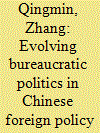

|
|
|
|
|
| Summary/Abstract |
Growing economically more powerful and confident, China is exerting unprecedented influence on global affairs. But the diverse voices and sometimes inconsistencies in its foreign policy behavior have confused many China watchers. Such phenomena demonstrate some new trends in Chinese foreign policy. In order to unveil such trends, this paper intends to look at Chinese foreign policy practices by employing the theoretical framework of bureaucratic politics. Its conclusion is that the foreign policy-making process of the People’s Republic of China (PRC) has progressed from the ideology based in-party factionalism of “line battles” to interest-based government politics of organizational competition. The early stage has distinctive Chinese characteristics, which are different from Western bureaucratic politics. But as Chinese society becomes more diversified, the bureaucratic politics in China begins to share more similarities with those in the Western democracies. Such trends render the application of Foreign Policy Analysis (FPA) to the research of Chinese foreign policymaking both necessary and beneficial to the construction of theories of foreign policy analysis, as well as research on China’s foreign policy itself.
|
|
|
|
|
|
|
|
|
|
|
|
|
|
|
|
| 4 |
ID:
142088


|
|
|
|
|
| Summary/Abstract |
Is the phrase, “History controls Korea-Japan relations,” the most accurate assessment of the situation? Some experts contend that the relationship after World War II is one of being “distant countries,” despite being so near. This assertion has maintained a certain validity even after the “normalization” of Korea-Japan diplomatic relations in 1965. In fact, the above description is very precise when it comes to describing the relationship between the two countries, which is complicated because of Japan’s colonization of Korea. Recognition of the fact that history is a pending issue for both countries is unavoidable. It is time, however, to change the stereotyped formula when analyzing these ties. Security issues, namely, the two sides’ security perceptions about East Asia, including the DPRK nuclear threat, should be added to these arguments as an influencing factor. The purpose of this paper is to clarify how Korea-Japan relations have changed since the DPRK developed nuclear weapons, additionally taking into consideration its three nuclear tests. In particular, this paper tries to show how Japan’s perceptions of the DPRK’s nuclear development and its policies have changed since the DPRK conducted nuclear tests—as well as what kinds of factors have influenced Japan’s perceptions of the DPRK. In addition, this study addresses the impact of Japan’s security perceptions toward the DPRK on the relationship between Korea and Japan.
|
|
|
|
|
|
|
|
|
|
|
|
|
|
|
|
| 5 |
ID:
142090
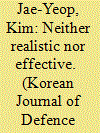

|
|
|
|
|
| Summary/Abstract |
This paper examines the logics and problems of U.S. nuclear weapon redeployment demands among the general public in the Republic of Korea (ROK) to cope with the nuclear threat from the Democratic People’s Republic of Korea (DPRK). Proponents of the idea believe that redeploying U.S. nuclear weapons on ROK soil will help to restore the military balance on the Korean Peninsula and strengthen strategic options for denuclearization efforts. However, U.S. nuclear weapon redeployment is not only contradictory to defense policy of both the ROK and the United States, but also not so effective in terms of both military and diplomatic aspects. The ROK and U.S. governments should seek and carry out more practical policy alternatives to deter military challenges from a nuclear-armed North Korea and revitalize efforts for denuclearization of the Korean Peninsula, rather than resorting to the illusion of U.S. nuclear weapon redeployment.
|
|
|
|
|
|
|
|
|
|
|
|
|
|
|
|
| 6 |
ID:
142086


|
|
|
|
|
| Summary/Abstract |
Peace through strength, regime change to democracy, and preemptive strikes are known to be neoconservative policies which are based on such values as hegemonic stability, democratic peace and war as a necessary evil. If a Republican candidate wins office in January 2017, the new U.S. administration will undertake a bottomup-review of the North Korea policy. The key variable will be whether North Korea returns to the dialogue or conducts another long-range missile test and/or nuclear test before the new U.S. administration comes in. If the long-range missile test makes a big advance by confirming North Korea’s capability of reaching the U.S. mainland and if the nuclear test turns out to be a success of miniaturizing nuclear warheads that can be placed on the top of ICBMs, the new U.S. administration will take it as a game changer. This kind of strategic game changer could revive neoconservatism that has been ostensibly dead in the U.S. security community and it could be applied to North Korea.
|
|
|
|
|
|
|
|
|
|
|
|
|
|
|
|
| 7 |
ID:
142085
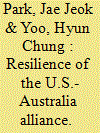

|
|
|
|
|
| Summary/Abstract |
Despite potentially significant differences between an American superpower’s and an Australian middle power’s global and regional interests and strategies, the U.S.- Australia alliance has remained resilient. Moreover, Australia has recently been very cooperative with the U.S. deployment of its military assets on Australian soil. What lies behind this intriguing set of circumstances in alliance relations? To address this question, this article begins by providing a historical overview to show that the U.S.- Australia alliance is resilient despite the lack of a mutually perceived threat. Then, this article criticizes the argument that the U.S.-Australia alliance continues because it is insurance against potential military threats, especially against potential Chinese threats. First, the likelihood of a “fundamental” attack on the Australian homeland is very slim. Moreover, the ANZUS accord lacks a formal mechanism that triggers an automatic U.S. involvement in the way that NATO’s Article Five mandates such a U.S. response in Europe. Second, currently the American and Australian threat perceptions regarding China vary. Canberra entertains less fear of a “rising China” than does Washington. Instead, this article provides order-centric rationales for retaining and strengthening the U.S.-Australia alliance, and in that context it analyzes the recent development of the alliance’s military aspects, including the deployment of U.S. Marines in Darwin on a rotational basis.
|
|
|
|
|
|
|
|
|
|
|
|
|
|
|
|
| 8 |
ID:
142089
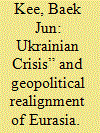

|
|
|
|
|
| Summary/Abstract |
This article focuses on the current arguments and geopolitical visions regarding the organizational shifts in Europe and the Eurasian region and the means for realization of these policies. It shows the responses of the major powers in Europe and Eurasia with regard to the “Ukrainian Crisis.” In this article also, analysis and comparison of the Eurasian strategy of China and Russia, which bear critical importance to geopolitical and geoeconomic considerations regarding the Korean Peninsula, is treated with significance along with the aforementioned issues. The article attempts to provide a short analysis of the implications of these pan-Eurasian strategic shifts on the Eurasian initiative of the Korean government. The concepts of Russia’s “Pivot to the East,” China’s “One Belt, One Road (OBOR),” and Korea’s “Eurasia Initiative” share a potential to stimulate the transition of the Asia-Pacific region from “the ocean of conflict” to “the ocean of peace.” However, in realizing these concepts, the relationship between Korea and the four powers (U.S.A./China/Russia/Japan) have a “strategic trilemma.” If the Eurasia Initiative can facilitate construction of the “continent of peace” in Eurasia, it will provide a vision and strategic opportunity to change the region form an “ocean of conflict” into an “ocean of peace.”
|
|
|
|
|
|
|
|
|
|
|
|
|
|
|
|
|
|
|
|
|